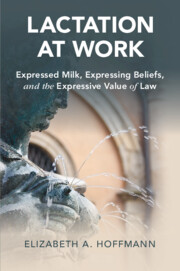Book contents
- Lactation at Work
- Cambridge Studies in Law and Society
- Lactation at Work
- Copyright page
- Dedication
- Contents
- Tables
- Acknowledgments
- Chapter One Introduction
- Chapter Two Lactation Law as Public Policy
- Chapter Three Expressed Frustration
- Chapter Four Milk and Management
- Chapter Five Allies Already
- Chapter Six Moralizing the Law
- Chapter Seven Conclusion
- Book part
- References
- Index
- Cambridge Studies in Law and Society
Chapter Two - Lactation Law as Public Policy
Published online by Cambridge University Press: 20 July 2021
- Lactation at Work
- Cambridge Studies in Law and Society
- Lactation at Work
- Copyright page
- Dedication
- Contents
- Tables
- Acknowledgments
- Chapter One Introduction
- Chapter Two Lactation Law as Public Policy
- Chapter Three Expressed Frustration
- Chapter Four Milk and Management
- Chapter Five Allies Already
- Chapter Six Moralizing the Law
- Chapter Seven Conclusion
- Book part
- References
- Index
- Cambridge Studies in Law and Society
Summary
The US Lactation at Work Law passed amid the growing international need to support breastfeeding mothers, particularly in the workplace. Societal changes, such as the increase of mothers in full-time, paid employment, and technological changes, such as electric breast pumps, significantly changed the world in which the Lactation at Work Law exists. As breastfeeding is a distinctively female practice, workplace lactation raises unique issues including the denigration of “mother issues,” the sexualizing of female bodies and breasts, and a need to accommodate working mothers’ presence at work, rather than their absence, as much other parental-rights legislation does. The decision to breastfeed reflects race and class inequalities; access to milk expression technology; and organizational resources, such as time, space, and legitimacy of milk expression. Globally, countries struggle to encourage breastfeeding among women workers through legislation, information campaigns, cultural programs, and other inducements – with mixed success. International forces influence breastfeeding as well, such as La Leche League International, which encourages breastfeeding, and infant formula manufacturers that impede lactation and discourage breastfeeding. Perhaps most important, the success of workplace milk expression is predicated on how organizations integrate accommodations law into their structure and culture, through shifting norms and adapting organizational change.
- Type
- Chapter
- Information
- Lactation at WorkExpressed Milk, Expressing Beliefs, and the Expressive Value of Law, pp. 28 - 64Publisher: Cambridge University PressPrint publication year: 2021

